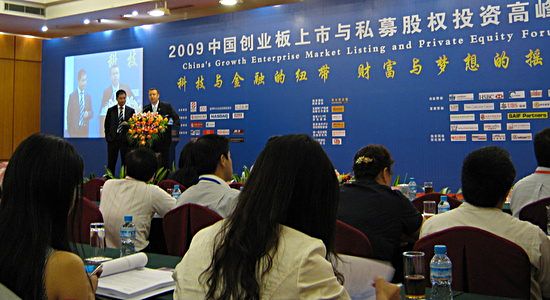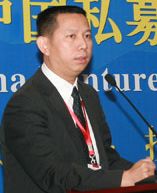
Forum in Shenzhen ahead of the launch of GEM, the equivalent of Nasdaq. Photo by Andrew van Buren
LAST WEEK, a Who’s Who of private equity firms, fund managers, venture capitalists, market regulators and academics gathered in the southern Chinese city of Shenzhen to brainstorm on strategies to ensure a successful launch of what many in attendance are hoping will be the country’s equivalent of the Nasdaq.
China’s Growth Enterprise Market Listing and Private Equity Forum was held just two months prior to the beginning of trade on the new capital raising platform – a board that experts say is sorely needed to facilitate the injection of private sector investment into innovative Chinese firms looking to be market leaders, especially in the areas of high tech and IT.
Speakers were at the ready with exact figures corresponding to the impressive resurgence of various indices in the region, including the Shanghai Composite (up nearly 80% year-to-date) and nearly as impressive recoveries in other stock markets.
But most cautioned that the underlying growth story in China of late, especially in A-share valuation recovery, was that of public funds being pumped into capital markets -- indirectly or otherwise.
As a body, the assembled experts warned that such stimulus-led spurs to share prices were unsustainable, and the arrival of the GEM is not a moment too soon.
With its growing list of innovative and ambitious SMEs, the Shenzhen GEM will help bring more choice and opportunity for private investment in a country known the world over for its ‘piggybank breaking’ private savings rates.
Mini-Nasdaq or Nasdaq rival?
Mr. Eric Landheer, Head of Asia Pacific for the NASDAQ OMX Group, said he has not been to a similarly themed conference in recent memory without a journalist asking him variations on the following question:
“Will the Shenzhen GEM be a competitor to the Nasdaq?”

Eric Landheer
He said that the new board would not take away business.
“The Shenzhen GEM is not our competitor. NYSE is Nasdaq’s biggest competitor,” he said.
Mr. Landheer should know, for under his leadership over the past two years, Nasdaq has nearly doubled its number of listed Chinese enterprises to its current 96, and the country has become the tech-heavy board’s single largest source of non-US listings.
He said that the two boards did share similarities, but these accentuated the major differences.
“We have three market tiers on Nasdaq: Global Select demands the highest standards. Then there’s the Global Market and finally the Nasdaq Capital Market. This third one is most similar to the Shenzhen GEM,” he said, saying it had the least stringent listing requirements of the three levels.
But he said that Chinese companies, and the planned new board in this southern Chinese boomtown, were not destined to always lag behind in terms of prestige and profitability, saying that one well-known local firm – China’s top web portal Baidu.com – was the only local component of the heavily monitored Nasdaq 100.
To ensure that the Nasdaq – and any comparable board – operated under the principles of fairness and transparency, continuous efforts needed to be made to keep vested interests from overlapping and throwing a wrench into fair market mechanisms.
“The GEM, like the Nasdaq, needs as fair and accurate a reporting regime as possible. Moreover, the fields of research, investment banking and market making must always be separated to prevent conflicts of interest,” Mr. Landheer said.

Kathy Zhang, MD of Financial PR, attended the Shenzhen forum.
To bring about this end, it was important for listed companies to use professional third-parties to serve as a “fair arbiter” conduit of information between listco and shareholder, and firms like Financial PR -- the largest IR firm in Singapore with offices in Hong Kong and China -- had critical roles to play in keeping the two-way channels of communication abuzz.
"After all, Nasdaq guarantees liquidity transparency and volume information, no matter the size of the company. It needs strict regulations and enforcement, and there should be public censure and punishment of rule breakers including on insider trading and for early traders. Therefore, investor relations (IR) is very important in order to maintain strong communication between company and investor,” he added.
GEM to sport 80x P/E!
Another veteran in the securities sector agreed that the board needed a stricter regulatory culture to survive, and then thrive.
And thrive it will, at least for those investors savvy enough to get in on the ground floor.
Mr. Wang Ping, Chairman of venture capital firm CHNVC, told NextInsight on the sidelines of the forum that the average price-to-earnings ratio by the end of this year for GEM board listed firms could rise to 80 times!

Mr Wang Ping predicts PE ratios averaging 80X for the GEM companies! Photo: Internet
But China’s securities watchdog would practice more stringent entry thresholds for the new board than most were anticipating.
“Around 400 companies have applied so far, and as of July 27, just 108 are being considered. But by the end of the year, I think only around 60 should win listing approval on the GEM,” Mr. Wang added.
Bourse democracy = volatility elixir?
The undercurrent to the two days of presentations was that the GEM board would help stabilize growth in China’s capital markets, and equally important – give a much needed shot in the arm to the country’s thousands of SME GEM-board hopefuls.
“The GEM’s listing criteria was announced on July 1 and meant that a truly multilayered, multileveled stock exchange would be created, allowing divergent forces to lead a more stable economic growth,” said Mr. Liu Hongru, former head of the CSRC, China’s top securities regulator.
Another market veteran agreed, saying that the past year’s financial meltdown on Wall Street, followed by hard times on Main Streets around the world, made it even more incumbent on financial regulators to provide more choice for capital and relatively safer havens amid volatility.
“The GEM will help insulate and fight against this global economic crisis. It will lead to more regulated, stable growth,” said Wang Shouren, general secretary of the Shenzhen Venture Capital Association.
He said a vibrant new capital raising market will be a benevolent tide overall, with the potential to lift all boats.
“Underwriters, lawyers and many others will all stand to benefit from the GEM. But how can we ensure a smooth launch? That can best be done by scrutinizing the some 200 investment projects looking to raise money on the new board.”
Mr. Long Wuhua, PhD, director of the Strategy & International Department of the Shenzhen Stock Exchange, said that the original founding charter of the GEM was to help stabilize growth, but now it is also being touted for its risk-management potential given the equity market meltdown over the past couple years.
“The board will help long-term investors better hedge risks. It will increase the ‘buffet style’ self-serve potential for investors here who will be better able to observe opportunities and performance from a position of higher market standards,” Mr. Long said.
Mr. Wang Shouren concurred that the GEM offers “a more stable environment for listed firms.”
But he cautioned that participants could not sit back and let regulators completely ensure smooth transparent operations of the new platform, and investor vigilance was still the name of the game.
“We still need good risk management skills, as well as price sensibility,” Mr. Wang added.
Mr. Zhou Dewen, head of the Wenzhou Small and Medium-sized Enterprises Association, voiced a more combative sentiment toward locally-grown Chinese SMEs that would choose overseas equity markets over the soon-to-be-launched GEM board.
“Offshore Chinese listcos are smugglers of sorts,” he said, opining that in fact the GEM was directly competing with foreign equivalents for the hearts, minds and purses of bourse hopefuls.
But he was sanguine on the GEM’s prospects, given its ability to learn from the mistakes of others.
“The GEM will be smaller and leaner, and will become more successful with time. Unlike the main board, it will be more difficult to abandon your original investment. This is a big difference between the two. That being said, everyone knows the launching any new board is very very risky,” Mr. Zhou added.
Recent story: "GEM could be proving ground for Chinese Microsofts, Intels of tomorrow"




 NextInsight
a hub for serious investors
NextInsight
a hub for serious investors






